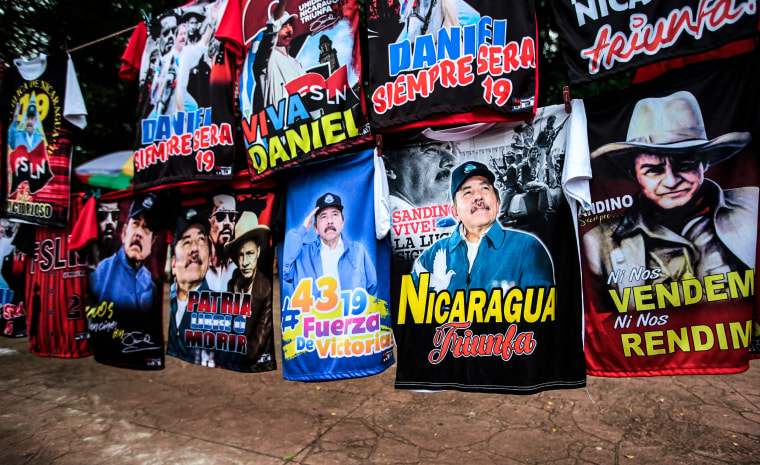After having accused them of being traitors involved with an international plot to topple him, Daniel Ortega, the former revolutionary and five-term president of Nicaragua, sent 222 political prisoners to the U.S. on Feb. 9. Then Nicaragua’s Congress voted to strip those who were Nicaraguan citizens of their citizenship. On Wednesday, Appeals Court Justice Ernesto Rodríguez Mejía declared 94 more political critics of Ortega to no longer be Nicaraguans, including noted authors Sergio Ramírez and Gioconda Belli.
In a desperate attempt to cling to power, Ortega has demonstrated his willingness to violate basic human rights.
Nicaragua's Congress will have to conduct a second vote to officially strip those it deems "traitors" of their citizenship. Many of the 94 the judge declared stateless were already living in exile but have been accused of “spreading false news” and forming “a conspiracy to undermine national integrity.” Stripping people of their citizenship as punishment is a violation of international law, but in a desperate attempt to cling to power and remain politically relevant in the Western Hemisphere, Ortega has demonstrated his willingness to violate basic human rights.
It didn’t have to be this way. As I wrote less than two years ago, Ortega “shifted away from his visions of a revolution and fell into the same trap that has haunted generations of leaders before him.” All the predictions that he would become a modern-day Central American dictator have come true. Maybe when Nicaragua was indeed the literal playground of U.S. capitalism, the world needed Ortega and the Sandinistas. But he has betrayed leftism in Latin America, and a revolution over 40 years old is clinging to survival as it destroys every semblance of democracy and freedom.
A rally Saturday in Managua that was staged to celebrate the banishment of Ortega’s critics was attended by Ortega loyalists who praised the move. “We are marching in celebration of the deportation of all the criminals who were detained, people who were coup plotters. ... What they were doing here was damaging Nicaragua’s image,” one such loyalist told Agence France-Presse.
The damage to Nicaragua’s image is being caused by Ortega, not his political opponents. As a 1980s revolutionary, he appealed to the hearts and minds of the global left, but now he is the equivalent of extremist Republicans in the U.S. who think that foreigners are contaminating the U.S. and that the homeland must be defended from them.
His more fervent and ardent supporters will always claim that Ortega is one of the last defenders against the scourge of American imperialism, an argument intended to instantly discredit anyone who dares to mention his record of cracking down on Nicaraguans’ freedom of expression and other basic rights. According to this worldview, anyone who isn’t with Ortega is completely against him. There is no room for debate or dialogue.
To maintain an environment in which Ortega can’t be criticized, Nicaragua violently oppresses its people. Five years ago, protests against pension reform that exposed a weakness in Ortega’s flank led to state violence and the systemic shutdown of media outlets.
The damage to Nicaragua’s image is being caused by Ortega, not his political opponents.
While Ortega’s regime is wrongly kicking Nicaraguans out of their country, an increasing number of Nicaraguans are leaving their homes and seeking asylum in the U.S. Nicaragua wasn’t historically known for having many asylum-seekers, but there have been so many in recent years that President Joe Biden made Nicaragua one of the countries eligible for an expanded asylum program even as it otherwise works to reduce crossings at the border.
The dilemma for the U.S. is that the more attention Biden and the U.S. give Nicaragua, the more Ortega will claim that the imperialist Yankee invaders with a history of causing havoc in his country are still trying to destroy it. It is a tactic that works well politically. The more America complains about Nicaragua, the stronger Ortega’s hold on Nicaragua.
That having been said, the U.S. should have instantly granted citizenship to the stateless Nicaraguans who arrived at Washington Dulles International Airport last week. Instead, the U.S. granted them temporary protection for just two years. Spain was the country that offered them full citizenship. The moves by Ortega were direct attacks on democratic principles that the U.S. claims to espouse, but given our country’s abhorrent past in Central America, perhaps to have acted as boldly as the Spanish did would have served to expose more American hypocrisy.
Not immediately offering citizenship could ding Biden and the Democrats in 2024. Republicans, who link progressives to socialism and socialism to dictatorships, are sure to exploit what Ortega is doing for their political gain.
And they have a willing audience. There are voters, in Florida especially, whose awful experience with leftist regimes motivates them to vote for the GOP. Maybe Democrats have come to terms with a state such as Florida already being in the loss column for future presidential races and that there is nothing to gain electorally with Nicaraguans living in the Sunshine State.
The Biden administration seems determined to just keep Nicaragua at arm’s length for now. A Feb. 10 State Department statement about a call between Secretary of State Antony Blinken and Nicaraguan Foreign Minister Denis Moncada emphasized “the importance of constructive dialogue between the United States and Nicaragua to build a better future for the Nicaraguan people.”
That future would have a greater chance of being “better” if the U.S. had acted more boldly last week. And it’s to our shame that we didn’t.

